You will be hard pressed to find a residential property that does not utilize door locks in any capacity. If you ever find a residential space like that, it is either that its occupants do not care about security, or that they simply exist in a utopia that everyone else has yet to discover. Door locks are an essential part of any residential space, and they are part of the building blocks for safety and security.
Most people are aware of this, but not many are knowledgeable when it comes to door lock types. Selecting the appropriate door lock from available door lock types is important. The reason is simple, some locks work better in one situation than they do in others. A basic understanding of residential door lock types will help homeowners and property managers choose the best locks to use at all times. Let’s begin!
1. Deadbolts
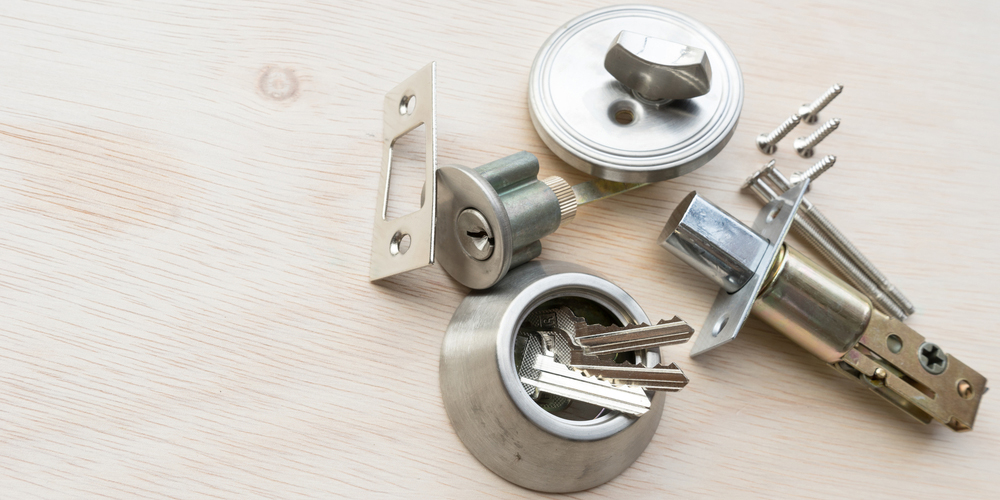
Deadbolts are arguably one of the most popular door lock types, and they are widely used in many residential properties. Due to their popularity, they are also a common fixture in commercial spaces. A majority of homeowners should be familiar with the single cylinder deadbolt, which can be considered a subset of door lock types. However, there are multiple types of deadbolts that can each be used in some capacity within a residential setting. As far as door lock types go, the deadbolt is mostly used to secure exterior doors. There is no law against using deadbolts inside of your home, but there are other door lock types which are better suited for this task (but we’ll address those later on). Another thing to keep in mind is the fact that a deadbolt does not utilise spring loaded mechanisms to work the bolt, hence the term “dead”. We will revisit this later on in the article.
The main reason why deadbolts are among the popular door lock types is that they are some of the most secure locks that you will ever come across. However, not every deadbolt is built the same, which is why there is a grading system that gives you an idea of how much force your deadbolt can withstand. The main types of deadbolts that exist are the single cylinder deadbolt and the double cylinder deadbolt. The relevant difference between these two deadbolt door lock types is that the single cylinder has a keyed cylinder on one side of the door, whereas the double cylinder makes use of a keyed cylinder on both sides of the door.
Single cylinder locks are far more prevalent, but some homeowners opt to use double cylinder deadbolts for the added security benefit. Remember how earlier I pointed out that some locks are better suited in some locations than others? There are homeowners who realize that a double cylinder could possibly limit your chances of escape in an emergency, so instead, they opt to place extra layers of security around their single cylinder deadbolt.
In lieu of using a double or single cylinder deadbolt, some prefer to go with a jimmy proof deadbolt. This particular door lock type is commonly found in apartment buildings or as a fixture on double doors. I would not be surprised if you’d never heard of a jimmy proof deadbolt, most people haven’t, but I guarantee that you have come across one at some point. It is one of the more humble and unassuming door lock types. The unique construction of this deadbolt positions it to offer better security by negating jimmying as a bypass method. The lock is a surface-mounted lock that is kept secure by the strike and by the body of the lock as well. Although this makes the lock more resistant to jimmying, it does not make it impervious to other attacks.
2. Door Knob Locks
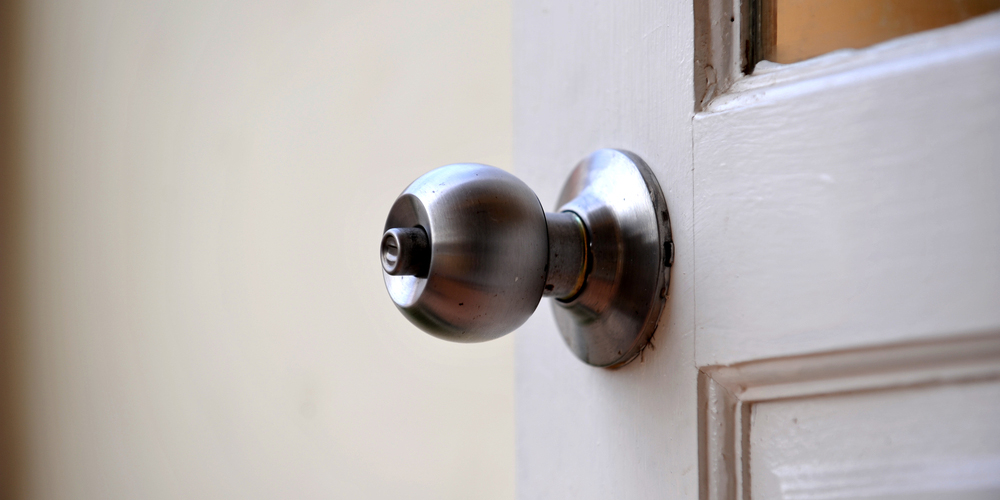
If you had to find a door knob in the next thirty seconds, you would probably know where to look. If you couldn’t reach the door knob in the allotted time, you would still know exactly where it was and how to get there. Door knob locks are easy to find, and they are mostly used for interior purposes. There are probably some door knobs installed on an exterior door somewhere, but whoever did that has the wrong idea (explanation to come). Among door lock types, the door knob might be the closest thing that is synonymous with interior use.
Knob locks are not ideal for exclusive external use, due to their limited amount of security. Unlike deadbolts, door knobs buckle easily under the exertion of force. The simple process of banging on a door knob with a hammer could destroy it. Once the knob itself is compromised, whoever did so will have very easy access to the lock cylinder that is housed within the knob. Now, forgive me while I amend my earlier statement. Door knob locks can be used on external doors, but only as long as they are paired with deadbolts that reinforce their security. However, if there is a solitary door knob on an exterior door, then it is most likely not there for security purposes.
These locks are more ideal for interior use. Entry door knobs allow for easy passage from room to room within your house, and they also do not pose a threat when it comes to emergency egress. It is important to be cognizant of the way a door knob works in comparison to other door lock types because this will help you determine the best places to install them. Learning about the potential vulnerabilities of your locks will aid you in making the right selection of door lock types that will keep your residential property secure.
3. Cylindrical Lever Locks
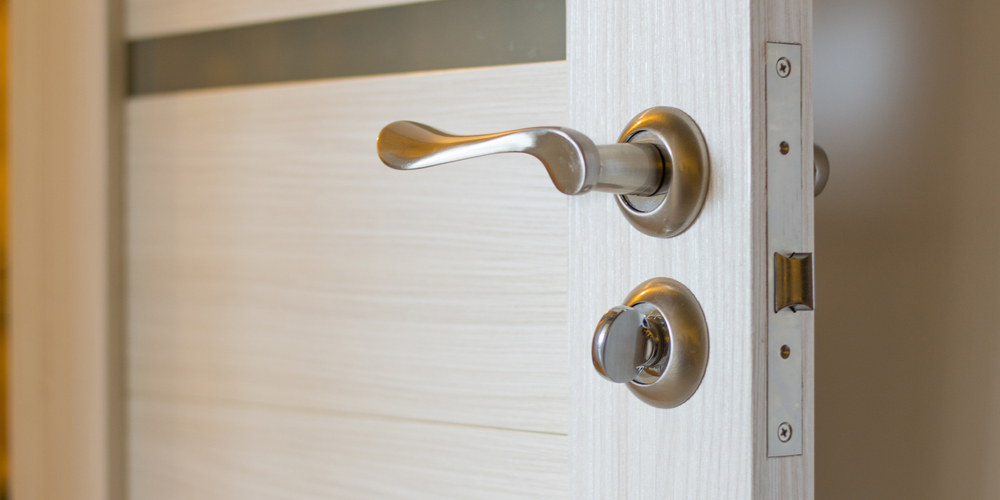
Similar to deadbolts, cylindrical lever locks are widely used in both residential and commercial settings, but people tend to interact with them more in commercial spaces. I believe that the reason behind this is the fact that cylindrical lever locks have to compete with door knob locks for space within the home, but there might be other factors at play.
Comparing the two locks, it would seem that a cylindrical lever lock is the easiest to operate between the two door lock types. The structure of the lock itself lends to easier and more efficient ingress and egress. Regardless of this, most people use door knobs inside their homes instead of cylindrical lever locks, but with that being said it is still a common door lock type for residential properties.
Although lever locks are suited for residential use, they are not the ideal solution for exterior doors that provide access to your home. There are many other door lock types that work well for exterior use, so forego using cylindrical lever locks. The main reason I say this is because there is a very high chance that your lever locks can be attacked and bypassed without putting up much of a fight. Similar to the door knobs discussed above, the handles of lever locks can be targeted and used as a potential access point with which to compromise the lock.
4. Mortise Locks
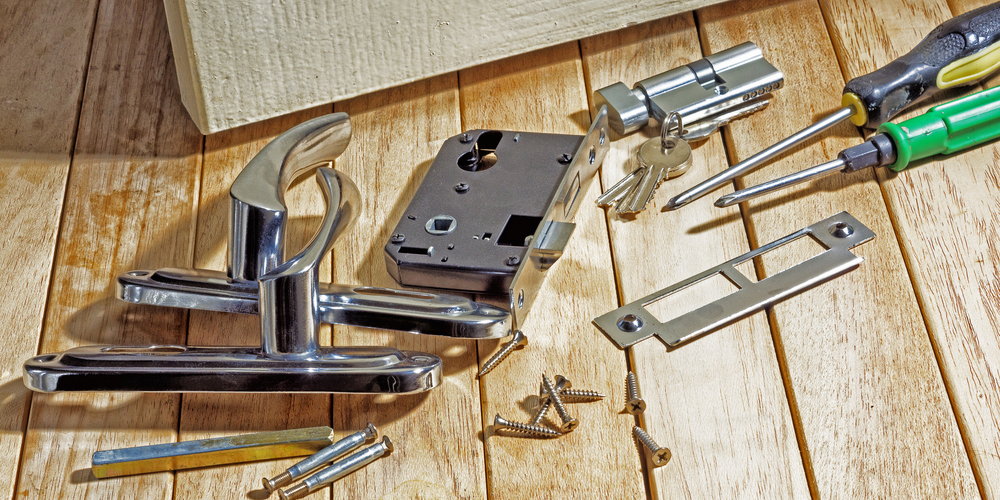
Mortise locksets are similar to cylindrical lever locks, in that they are more widely used in commercial properties, although they are also common fixtures in many homes. I should point out that there are many door lock types that crossover between residential and commercial use. Most of the homeowners who have mortise locksets either went out of their way to get them or the lockset was already installed on their doors. It is often the case that older homes have mortise locksets, and some owners choose to continue to maintain these locks instead of having a locksmith install new locks. There is nothing wrong with this because there are a lot of benefits that can be reaped from using a mortise lockset.
Learning more about mortise locks will provide you with a more in-depth understanding of the way mortise locks work and how they are used. A mortise lock generally consists of intricate hardware that is mounted in the door. Some of the key parts of the mortise lock are the threaded lock cylinder and the cam (which engages the lock and allows the latch to be retracted). One of the factors that have helped fuel their popularity of their years is the strength of the lock itself.
Although Grade 1 deadbolts are renowned for their strength among door lock types, mortise locks are equally as revered, and considered to be some of the most reliable locks available. Mortise locks are also commonly found in apartment complexes, similar to the jimmy proof deadbolt that we discussed earlier. The presence of these locks usually denotes that security is at the forefront of the user’s mind.
5. Euro Cylinder Locks
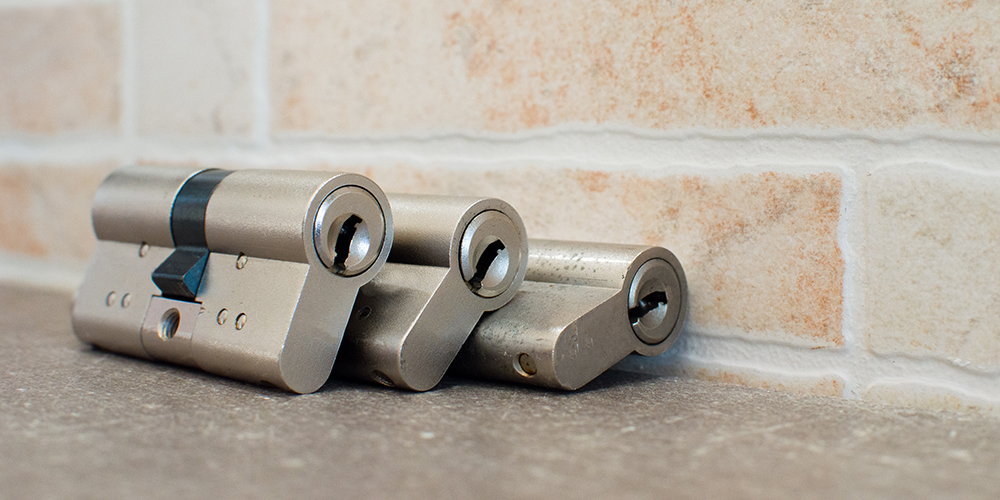
As the name suggests, Euro Cylinder Locks are door lock types that are more frequently used in Europe, and other countries, than they are in America. You can still find euro cylinder locks around if you look hard enough, but you will probably not find them being used as the primary lock on any exterior door. In most cases, euro profile cylinders can be used to secure patio doors, or even used as a door lock solution for interior double doors. The features of a euro cylinder lock are the primary reason why they are not suited for exterior doors. A euro cylinder lock body is easily prone to damage, and wear and tear over extended periods of time. The construction of the lock does not lend itself to security, and the standard lock bodies can be easily snapped, which will leave your home exposed.
Of course, there are still some people who believe that a lock is a good option for their homes because they have other priorities other than security. I will say that even though the construction of the lock does not make it more secure, it does make it much easier to install and use. Euro cylinder locks are self-contained devices which makes their installation process far easier than with other locks. However, learning more about door lock types should show you that just because a lock is easy to install doesn’t always make it the right option for your home.
6. Electronic Locks and Smart Locks
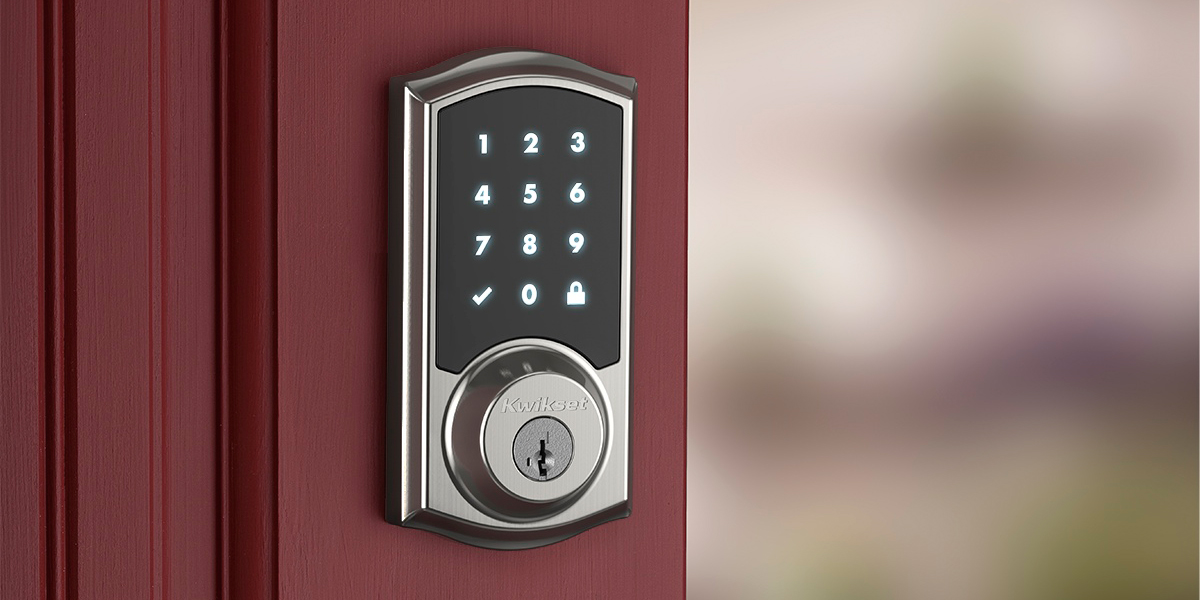
Electronic locks are also commonly used for residential properties, and this goes for both homes and apartment complexes. Many people often group smart locks and electronic locks together, but doing so would be incorrect. You are right to think that smart locks are electronic locks, but not every electronic lock is a smart lock. There is a fine line between the two, but knowing where to tread is a fairly easy task, and one that will aid you in choosing the right door lock types. Using electronic locks or smart locks on a residential property is mostly done when there is an inherent need for better access control, or simply if a resident wants to install a lock that appears to be more efficient.
The true definition of a smart lock shows that a smart lock has to receive a specific set of instructions from an authorized device in order for it to be locked and unlocked. These instructions are usually transmitted wirelessly, and they adhere to wireless communication protocols. Electronic locks do not depend on wireless communication for the lock to be engaged, they merely depend on the assistance of an electric current to be locked or unlocked.
It is crucial that any homeowner who is considering installing electronic locks in their home understand the way these locks work, as well as the vulnerabilities that they have. Doing so will ensure that they are adequately prepared to combat these vulnerabilities should they ever arise. For instance, you do not want to install electronic locks that will compromise your home security during a power outage. It should also be noted that electronic locks and smart locks incorporate the traditional structures of many of the locks that have been discussed above. For instance, there are electronic locks (and smart locks) that make use of deadbolts, mortise locksets, and even euro cylinders. However, due to their unique features, these locks have to be grouped on their own.
Honorable Mentions
The door lock types that we took a look at up above are not the only door lock types that are available for residential use. There are some locks that are not viewed as traditional door lock types, but that I believe should be given an honorable mention because they are still useful in residential spaces.
1. Padlocks
Padlocks have been discussed at length several different times on this blog. Ralph took the time to dive into the history of padlocks, as well as compile a list of the best padlocks of all time. Due to the nature of padlocks, people often overlook them when they are deciding on door lock types. Padlocks have a plethora of uses, and the fact that they are portable makes them appealing to many homeowners.
These locks are often used as auxiliary add ons that are meant to increase the security of a measure that is already in place. However, padlocks can be used on their own or in conjunction with other locks to yield many security benefits. Even though padlocks have evolved greatly over time, they have still maintained their integrity as dependable locks. Padlocks can be used to secure garage doors and chains that are used to lock sliding doors. Although they are not installed on doors like traditional door lock types, they shouldn’t be ignored.
2. Cam Locks
Cam locks are not door lock types that are used to guard your camera, although that would be a nifty little lock. These locks are very common in residential spaces, but they are not used on entry doors so they are often dismissed as door lock types. Cam locks are easy to spot in a home. They are commonly found securing kitchen cabinets or file cabinets and drawers that are used in home offices. Also, you can find these locks being used to secure mailboxes. Cam locks are door lock types that are used to secure doors, just not the traditional entry doors that you might have thought of.
A cam lock works in conjunction with a tailpiece, in order to operate the lock. In comparison to other door lock types and their security levels, cam locks are on the lower rung of things, but they are still very handy in the way they are used. Essentially, as long as you are not storing items that should be kept in a security safe in your cabinet at home, then cam locks are totally suitable.
Final Thoughts
There are many more door lock types that we did not take a look at today, after all, the world of locks is vast and diverse. The key thing that I want you to be aware of today is that there are many options at your disposal when it comes to door lock types. This might sound like a good thing, but it increases the chances of you selecting the wrong door lock types. If you walk away with anything today, let it be the fact that a proper understanding of your lock and research into the way it works, will help you select the best door lock types for your residential property.
The post 6 Types Of Door Locks Commonly Used On Residential Properties appeared first on United Locksmith.
from Blog – United Locksmith http://ift.tt/2G1i7zL
No comments:
Post a Comment